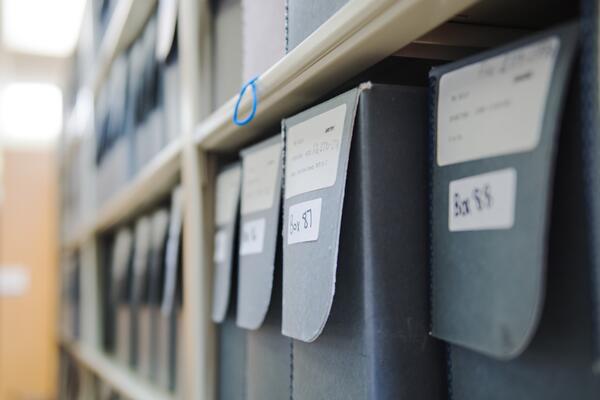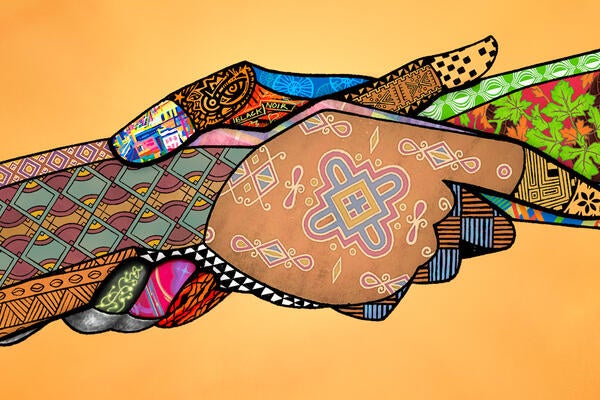
Reconciliation and cross-culture relationship building through hockey
High performance hockey camp builds relationships and cultural connections with Saugeen First Nations youth and Waterloo Warriors

High performance hockey camp builds relationships and cultural connections with Saugeen First Nations youth and Waterloo Warriors
By Emily Brant Office of Indigenous RelationsCollaborating between the University of Waterloo Men’s Varsity Hockey team, United College and the Saugeen Recreation Department, a high-performance hockey camp was developed to foster confidence, pride and relationship building among Indigenous youth and non-Indigenous players from Waterloo. The purpose is to provide a skill-building hockey camp built with traditional teachings of the Saugeen Anishinaabe that help build belonging and pride in all youth.
The Waterloo hockey team is positioned as hosts and facilitators of this physical skills program, which took place for a day-long camp on January 6th and will happen again on January 13, 2024. For any rural community, the lack of available arenas results in lack of opportunity and the Waterloo Warriors Men’s Varsity Hockey team is uniquely equipped to offer innovative facilities and specialized knowledge through our hockey team.
Nolan Lee is a fourth-year student in the Faculty of Science and played a key role in assisting Dr. Bimadoshka Pucan, professor of Indigenous Studies, in organizing this initiative.
 “During a presentation in class, I mentioned I was on the hockey team and before every game there is a Land Acknowledgment announcement, but it is very quick and the same one every time. After class, Dr. Pucan mentioned her community, Saugeen, has a hockey team and offered me a chance to help coach the kids,” Lee says.
“During a presentation in class, I mentioned I was on the hockey team and before every game there is a Land Acknowledgment announcement, but it is very quick and the same one every time. After class, Dr. Pucan mentioned her community, Saugeen, has a hockey team and offered me a chance to help coach the kids,” Lee says.
Saugeen youth participating in the Annual Little NHL (U-15 and U-18 divisions) are provided transportation from Saugeen First Nation to Waterloo’s Columbia Icefield. The Waterloo team then provides two hours of physical skill building, followed by ice time. Together, the Saugeen youth and Waterloo players attend lunch and workshops. Team coaches are also invited to participate in expert-level training.
The participants are also engaging in the Seven Grandfather Teachings for Sports Leadership, a workshop hosted at United College, and youth from Saugeen are leading the Waterloo Warriors through Saugeen Anishinaabeg protocols. This camp engages the physical, mental, social and spiritual principles of “Mino Bimadziiwin” (the good life). Academic programs are highlighted by advisors in hopes that Saugeen youth will consider attending Waterloo in their near future.
“This will be a tremendous experience for our varsity hockey players to work with young Indigenous athletes on their hockey skill development, combined with an opportunity to gain knowledge of Indigenous Teachings related to sports leadership,” says Brian Bourque, coach of the Waterloo Men’s Varsity Hockey team.
Partners of this initiative include Lee, Dr. Pucan, the Office of Indigenous Relations, Waterloo’s Athletics and Recreation Services, United College and Nike, who provided youth jackets and apparel discounts.

“Many students demanded the land be returned to Indigenous control. Further discussion of this is left to the development of the person’s ethic to use our individual gifts to give back to Indigenous communities,” says Dr. Pucan, who emphasizes that centering the community is at the heart of this work.
Although the original plan was to have four sessions to build and solidify connections between students and First Nations youth, this year will act as a pilot project with hopes of building up more opportunities next year.
The final day-long camp for 2024 will be held this Saturday on January 13.

Read more
Upside Robotics secures new funding to accelerate the future of sustainable farming

Read more
Discover the meticulous work that uncovered Black stories on campus and preserved them for the future

Read more
A message from the President and Vice-Chancellor
The University of Waterloo acknowledges that much of our work takes place on the traditional territory of the Neutral, Anishinaabeg, and Haudenosaunee peoples. Our main campus is situated on the Haldimand Tract, the land granted to the Six Nations that includes six miles on each side of the Grand River. Our active work toward reconciliation takes place across our campuses through research, learning, teaching, and community building, and is co-ordinated within the Office of Indigenous Relations.